 Petzlover
Petzlover Indian Bull Terrier is originated from United Kingdom but Schillerstovare is originated from Sweden. Both Indian Bull Terrier and Schillerstovare are having almost same height. Both Indian Bull Terrier and Schillerstovare are having almost same weight. Both Indian Bull Terrier and Schillerstovare has almost same life span. Both Indian Bull Terrier and Schillerstovare has almost same litter size. Both Indian Bull Terrier and Schillerstovare requires Low Maintenance.
Indian Bull Terrier is originated from United Kingdom but Schillerstovare is originated from Sweden. Both Indian Bull Terrier and Schillerstovare are having almost same height. Both Indian Bull Terrier and Schillerstovare are having almost same weight. Both Indian Bull Terrier and Schillerstovare has almost same life span. Both Indian Bull Terrier and Schillerstovare has almost same litter size. Both Indian Bull Terrier and Schillerstovare requires Low Maintenance.
 Not much is known of the dog breed crossings that James Hinks carried out to get the Indian Bull Terrier. It is believed that he used the old English Bulldog, the English White Terrier and even the Dalmatian and Greyhound.
Not much is known of the dog breed crossings that James Hinks carried out to get the Indian Bull Terrier. It is believed that he used the old English Bulldog, the English White Terrier and even the Dalmatian and Greyhound.
The dog comes from the UK but was later introduced to India. The Indian Bull Terrier, known as the Indian gladiator was introduced to India by the British Colonial Forces. The dog was developed from British dogs, namely Irish and English strains of the Staffordshire Bull Terrier, the original English White Terrier and the Hinks Bullterrier breed. The legacy of Hinks is known worldwide – he is known as the one who mixed white terriers to bull dogs to make bull terriers. He made a breed that was the base breed of the egg shaped head bull terriers we see today.
The dog is similar in looks to the old type English Bullterrier. The dog has always been valued as a fighter and as a watchdog.
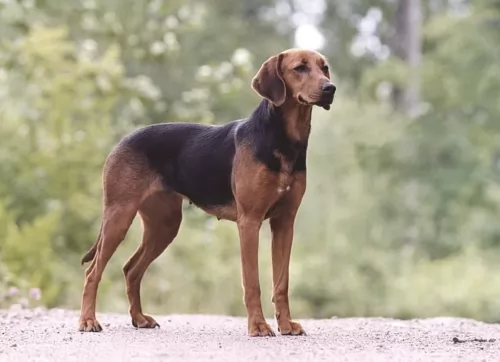 The Schillerstövare originated in Sweden, being named after a Swedish farmer, Per Schiller. After he died, the dog was named Schillerstövare in 1907, and was Sweden's first native dog breed.
The Schillerstövare originated in Sweden, being named after a Swedish farmer, Per Schiller. After he died, the dog was named Schillerstövare in 1907, and was Sweden's first native dog breed.
The Swedish Kennel Club recognised this dog in 1907 and it is also recognised by the Federation Cynologique Internationale as well as a number of minor kennels and dog clubs.
The dog has always been used as a hunting dog and the English Foxhound is the e foundation for this breed.
 The Indian Bully is a powerful, muscular, athletic and aggressive breed. He is a medium sized dog standing at roughly 46 cm to 56cm and weighs in the region of 20 – 30kg, both male and female.
The Indian Bully is a powerful, muscular, athletic and aggressive breed. He is a medium sized dog standing at roughly 46 cm to 56cm and weighs in the region of 20 – 30kg, both male and female.
As a Molosser, he has a strong, lean body with fairly long legs. Because of the white coat, quite a lot of them are born deaf and they also have skin allergies. The coat of the Indian Bull Terrier is short and smooth and nearly always white although you may well find some small dark markings on the coat. While solid white is the more common color, tan, red-brown and brindle can also be seen. He has the traditional egg-shaped head, erect ears, slanted eyes and long tail.
Your robust Indian Bull Terrier is a fearless dog, and where he has always been used for fighting in India and Pakistan, they are seeing the value of owning him as a pet too.
He is a loving, devoted pet, regarded as a bit of a clown. He is active and intelligent and apart from him wanting a lot of exercise, he just loves being with his human family, being involved with their hike, walks, ball games and swimming.
Being such a robust, active breed, he isn't suited to life in the city where the home is tiny and with little space to run. He is also strong-willed and maybe this characteristic of his might prove to be a bit of a handful for the first time dog owner.
He will need to receive early training and socialization, more so when there are children in the home. He can be inclined towards aggressiveness. They are capable of bonding with kids in the home but they can lean towards aggressiveness with other children.
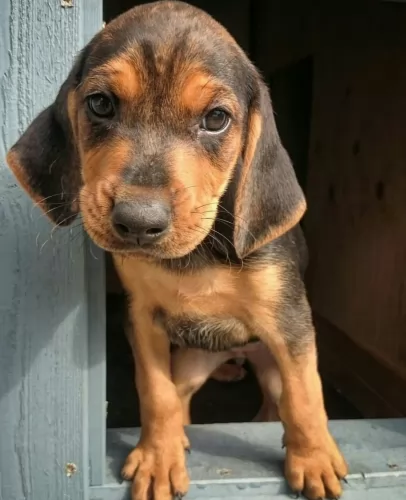 The Schillerstövare is a medium to large sized dog. They’re athletic and muscular.
The Schillerstövare is a medium to large sized dog. They’re athletic and muscular.
Standing at between 53–61cm in height and weighing in the region of 18–25kg, the coat of the dog is fairly short and harsh, with the color being black and tan.Sometimes you’ll see some white markings on the chest and paws.
The head is domed, the eyes brown, bright and alert and the ears of the dog are broad, medium length and floppy. The long tail is carried low or held out when running or alert.
If you allow your Schillerstovare to have puppies, you can expect between 3 to 7.
The Schillerstovare is a calm dog but he can get petty lively when there’s a game to be had. He gets on well with well disciplined children who have been taught to be kind and respectful to animals. He also gets on well with pets in the home. Just like with most other dogs, he will need to be trained and socialized as he is a strong willed, confident, dominant dog.
He is friendly and active but will be somewhat reserved around strangers.These dogs will require a lot of exercise and will need quite a bit of space too. They aren't well suited to small properties in the city. He will need a daily walk but also a chance to get off his leash and run free in the park. Other forms of exercise such as hikes, ball game and swimming will delight him.
 Indian Bull Terriers are affectionate, playful 4-legged family members. They are loyal, protective and social and will get on well with their own human family members but not necessarily with strangers.
Indian Bull Terriers are affectionate, playful 4-legged family members. They are loyal, protective and social and will get on well with their own human family members but not necessarily with strangers.
Precautions need to be taken around visitors who aren't familiar with the dog. He is powerful and energetic and must be trained and socialized to become the obedient, loving, loyal pet he is known to be.
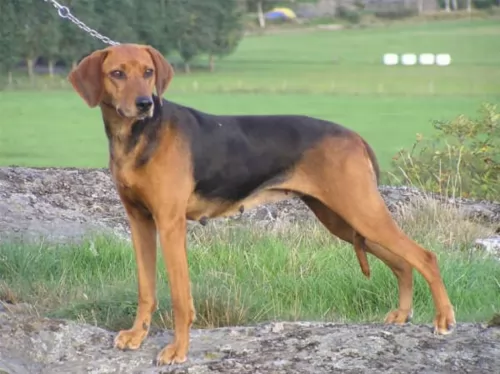 Schillerstovares are social, loving, friendly, loyal dogs who enjoy being around their human family. He’s going to need a lot of exercise, both mental and physical to keep him from boredom and frustration.
Schillerstovares are social, loving, friendly, loyal dogs who enjoy being around their human family. He’s going to need a lot of exercise, both mental and physical to keep him from boredom and frustration.
He will rely on you for at least a daily walk. He is strong-will and confident and will do well in a family where they are active and where they are firm, patient, kind and consistent in their behaviour towards him because then he ticks all th right boxes for being a splendid pet.
 With love and good care, your Indian Bull Terrier can reach up to 14 years of age and even more.
With love and good care, your Indian Bull Terrier can reach up to 14 years of age and even more.
If you own the white Indian Bull Terrier, you need to keep in mind that deafness is found in many white dogs. Another concern for your white dog is sun protection. Whether white or one of the other shades, your dog has short, sparse hair and spending hours in the sun can be hazardous to him and he can suffer with serious sunburn. Serious sunburn can lead to other complications such as cancer.
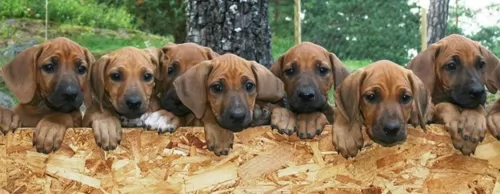 Even though your Schillerstovare is a healthy dog breed, hip dysplasia is a common dog disease that many dogs get.
Even though your Schillerstovare is a healthy dog breed, hip dysplasia is a common dog disease that many dogs get.
This is a skeletal disease when a dog’s hip joints become partially dislocated. It can be very difficult for your dog to get around, and he can also develop arthritis. It gets very sad when your dog doesn’t even want to participate in games anymore.
 Your Indian Bull Terrier has a short coat and he doesn't thrive in cold, damp weather. When its really cold, keep him indoors or put a sweater on when he needs to go outdoors.
Your Indian Bull Terrier has a short coat and he doesn't thrive in cold, damp weather. When its really cold, keep him indoors or put a sweater on when he needs to go outdoors.
Give him a nice, warm, dry place to sleep and ensure that if he goes outside, there is both sun and shady spots for him to lie.
This is a low maintenance dog, so a twice-weekly brush will do him the world of good. It will get rid of loose hair, he will love the closeness the brushing provides and the brushing will keep his coat shiny and healthy.
If you have a white Indian Bull Terrier, if he has dirty marks on his coat, you can just wipe him down with a damp cloth.
Remember to do regular checks on his ears and teeth too. Tooth decay can bring on a host of illnesses for your pet.
If you are going to be giving your pet commercially manufactured dog food, make sure its the best there is.
Your Indian Bull Terrier is an active dog and you want to make sure that he remains healthy and active for the 10 to 14 years that he is with you. If you're unsure as to how to feed your pet, speak to your vet.
It will always be to your pets benefit to feed him some homemade food too and cooked chicken, brown rice and pasta and vegetables will keep his eyes bright and alert. If you can, try to add in some raw meat into his kibble too as this helps to keep his skin healthy. Never ever leave him without a constant supply of fresh, cool water.
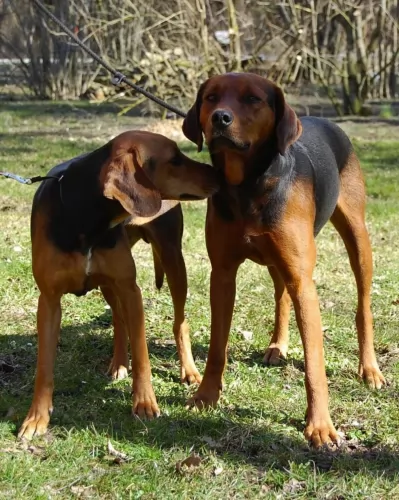 With his short coat, the Schillerstovare is considered a low maintenance dog and requires a minimal amount of grooming. Brushing should be done twice a week to remove loose hair. The harsh outer coat seems to repel dirt and dust.
With his short coat, the Schillerstovare is considered a low maintenance dog and requires a minimal amount of grooming. Brushing should be done twice a week to remove loose hair. The harsh outer coat seems to repel dirt and dust.
Trim your pet’s nails, check inside his ears for signs of redness, make sure his eyes are bright and clear and make sure he doesn’t have any unusual lumps on him.
Make sure his vaccines are up to date to avoid deadly canine diseases. Take him to the vet when you suspect he isn’t his normal self.
Dogs, just like humans, do well on good, nutritious diets. Feed a human lots of junk food and sweets and they’ll grow up to be obese and unhealthy. That's exactly how it is with dogs too. Some of the best commercially manufactured dog foods are convenient and they can be good if you look at the top brands. Look for ones that cater for your dog’s age, size, breed and activity levels. This dry kibble can be made more inviting for your pet when you include some homemade food.
Dogs just want simplicity so that they don’t battle with digestive problems. Boiled chicken, sweet potatoes, brown rice or pasta, carrots and spinach will be wonderful for him when you chop the food up and add it into the dry kibble twice a week. See his tail wag and his brown eyes light up when he smells this treat. Some raw meat added up occasionally will also contribute to your pet’s heath.
Make sure he is never without a constant supply of fresh, cool water.